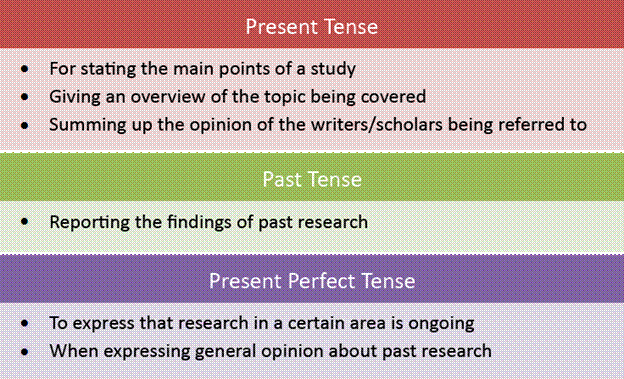Verb tenses inform readers when a specific event or action occurs. In formal writing, though, tense usage goes beyond the basic representation of chronology. Tense choice also shows the degree of generality intended and reveals an author’s attitude toward the idea/theory that is reported.
To obtain insight into tense usage in formal writing, a standard academic paper can be divided into its most general framework, and grammar usage can be molded according to the standard framework used in the specific subject area. This article will mainly explore and expand on the common usage of tenses in quantitative and scientific studies.
Introduction
The Introduction section contains background information, which is usually accepted as facts in a specific subject area. The study’s significance also needs to be stated; along with this, a brief summary of the author’s opinion is also expressed. This section is normally written in the present tense considering its contents—presentation of accepted facts and current opinion of the facts and theories being reported.
Methods
The Methods section describes the processes that were followed to arrive at a particular outcome. Since these processes usually take place before arriving at a result, the methods are generally written in the simple past tense. Moreover, the passive voice is frequently used in this section.
Discussion & Conclusion
Authors may use a meticulously selected (and contextually relevant) combination of the present and past tense in this section. For example, the conclusions and processes can be summarized in the past tense, while the implications and future relevance can be expressed in the present tense. The Conclusion section can also be created in a similar way considering the contextual significance of the facts and implications (for instance, the past tense can be used to refer to a theory or fact that has been sufficiently debunked in a field).
The table given below can be used as a simple reference.

As there are no absolute rules of tense usage when writing literature reviews, either the past or the present tense can be used (for instance, it may seem prudent to discuss the literature in line with present-day arguments rather than as accepted facts). It is essential to make sure that the tense usage is consistent, or it may confuse the readers.
Tense usage in the humanities varies considerably from that in scientific papers. For instance, the field of Literature uses the “literary present” when expanding on a work of fiction—the authorial intent exists in a timeless world that is best represented in the present tense. Nonetheless, qualitative studies in the humanities still stick to the standard framework for tense use described in this article.
Besides, if you are looking for an AI-driven writing tool to enhance your writing, then check out Trinka, the world’s first language enhancement tool that is custom-built for academic and technical writing. It has several exclusive features to make your manuscript ready for the global audience.

